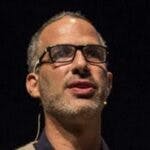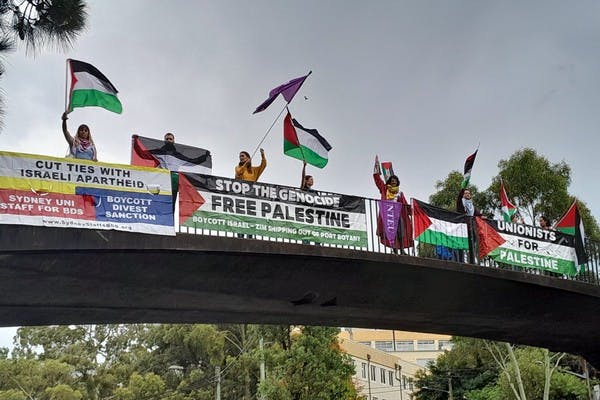Published: 6 October 2023
Last updated: 5 March 2024
Israelis used to scoff at those who left the country. On his latest visit home, expatriate MATI SHEMOELOF finds the mood has changed.
Every year I visit Israel, there is a regular ritual where my best friend, the radio broadcaster Eran Sebbag, makes fun of me in front of all my friends about the fact that I left Israel for Germany. You can hear him making jokes about my broken German as he imagines how I mumble in Berlin, struggling with particular words. But on my last visit, Eran refused to come and make my friends laugh. He said he was not in the mood because of the government’s coup.
This is one example of how I experienced a new attitude in Israel towards me and my life outside of Israel. In the past, my immigration to Berlin has been viewed as a betrayal of Israeliness. Within this, other things were included: a betrayal of the Hebrew language and of Hebrew literature.
And for some left-wing Israeli patriots, it was also a betrayal of their political activism. But now, not only my friend Eran has changed. Suddenly, everyone wants to how I knew to leave Israel in time - 10 years ago. I receive quite a few requests for advice on Facebook from people who want to emigrate to Berlin.
During my visit in August, I was invited to speak on the program Cultural Agent with Kobi Meidan on the public Kan TV channel. My poems that were published in a magazine that deals with the diaspora have become part of the Israeli media agenda. In the studio, the discussion evolved around “relocation”. They were not talking anymore about those who “betrayed the country and left”.
I did like that language change, of course. But I have to admit I never did “Relocation to Berlin”. No company invited me to work. On the contrary. I arrived in Berlin on September 23, 2013, with 23 kilos of luggage and nothing else. I didn't have a job in Berlin or a relocation agent to help me.
Suddenly, everyone wants to how I knew to leave Israel in time - 10 years ago
Plus, I left after the social protests of 2011 failed. Now, the new protests for democracy are still going on. During my recent visit, I discovered that Israelis are divided. On the one hand, there are those who feel great despair and helplessness in the face of the government that has split Israeli society in two. People can't sleep at home, function at work, find rest in their free time. One artist from Haifa wrote to me that it was precisely those depressing days that made him write intensively.
"I have no chance of neutralising the coup d'état and that's why I'm sad. But I feel a cold, yet active identification with the protest movement. They have no Arab speakers, nor a clear message of resistance to Israeli occupation or capitalism in all its forms. And it has a lot of militarism," he wrote to me.
And in this camp, I even hear about elderly people who push their children to emigrate from Israel. One young friend from Beer Sheva that I met in Sinai told me that he had a fight with his mother. He shouted at her that he didn't want to leave Israel, even though they had a German passport.
On the other hand, there are those who feel empowered, strengthened by the fact that hundreds of thousands have been marching for more than 32 weeks and demonstrating together all over the country. In this camp there is still hope. They talk about united communities that were separate in the past. There is feeling that this camp will provide a new vision for Israeli society.
One friend from the village Pardes-Hana explained to me that the act of the joint demonstration has played a part in removing the alienation and helplessness she felt. “The weekly demonstration gives me a toolbox of emotions to face the government's decision to change the democratic nature of Israel.”
But now I’m back again in Israel. I was invited to read my diasporic poems at an academic conference in Bar Ilan University exactly two weeks after I returned to Berlin in August. I felt bad about returning to Israel so fast. This time, after the conference, I went straight down to the Sinai desert and beach. I told myself it was because it was so long since I had visited there. In truth, I did not want to see Israel so broken and hurt again.
One young friend told me he had a fight with his mother. He shouted at her that he didn't want to leave Israel.
While I am writing this, the night before my flight back to Berlin at a friend’s house in Tel Aviv, I heard a demonstration on Hovavi Zion Street. I went outside to see that the crowd had reached nearby Bogarshov Street. It was a demonstration against the arrival of Rabbi Yigal Levinstein, who had called the LGBTQI movement “a tyrannical movement that exploits the plight of the youth to multiply an abnormal situation”. The protesters brought flags of "No pride, no democracy".
The chants were loud. The rabbi arrived but had to flee, under police protection. I stood with the demonstrators, I was part of the noise, chants. And then I, too, felt the power of the protests. I thought that this must have been how the Israelites felt thousands of years ago when they came to overthrow the walls of Jericho with trumpets and musical instruments.
This is the power of humans to break down the stone walls of the dictatorship that is approaching and coming to Israel. Maybe now, with everyone wanting to leave, I am thinking of coming back to Israel.
RELATED STORIES
'It's a question, whether the Jewish People are capable of being a people with a country' (Haaretz)
Education has degenerated into religious indoctrination, messianism prevails over Zionism, and the current government is a “historical accident”. Israel Prize winner, historian Professor Anita Shapira, says, “If the government’s plan is implemented, it's time to pack”.
Photo: A plane reflected in the terminal at Ben Gurion Airport in Tel Aviv (Aero VIP)




